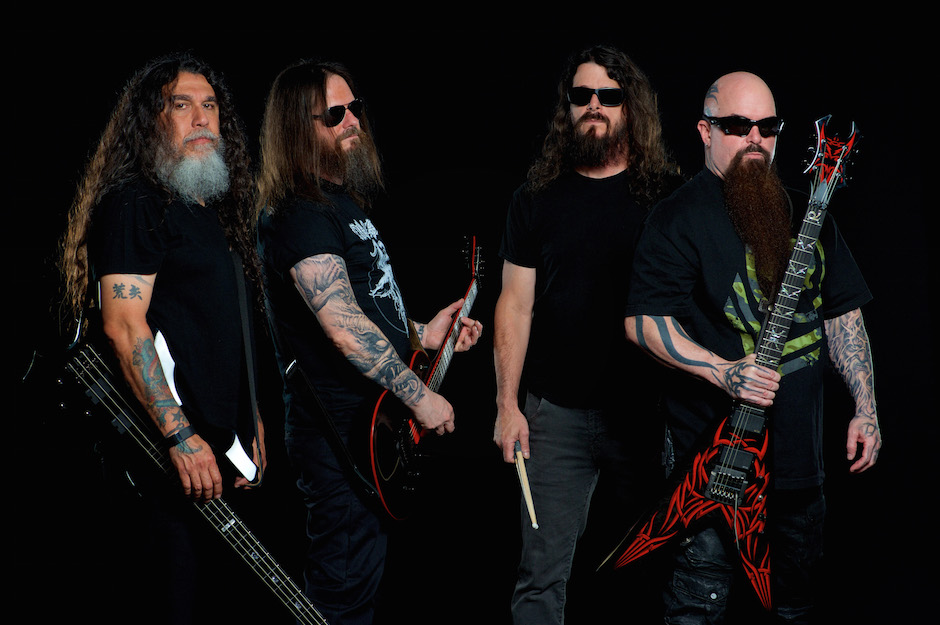Since Slayer released their most recent blood- and spittle-stained metal masterwork, World Painted Blood, back in 2009, the entire face of the band they started as teenagers has changed. Founding guitarist Jeff Hanneman tragically died as a result of alcohol-related cirrhosis in 2013 and original drummer Dave Lombardo left the band the same year due to business disputes. So with half of their lineup no longer part of the band, Slayer was thrown into flux; bassist/singer Tom Araya and guitarist Kerry King had to mull the decision whether to carry on.
But for King at least, as he explains over the phone, the decision was natural and, importantly, practical. “I don’t want to change careers,” he says with a gruff laugh. “That doesn’t sound fun to anybody. But once you get beyond that, you just gotta grab the prize, so to speak.” So they pressed on, started work on new material, both from rough demos that Hanneman left behind and from new ideas that King drummed up with Araya and Exodus guitarist Gary Holt, who joined Slayer permanently after Hanneman’s death. And now, two years later, they’ve returned with Repentless, a record as unrelenting as all of their 11 previous.
To mark the occasion of this momentous effort, King took the time to outline some of the biggest lessons he’s learned over the course of his time in the band, from the turmoil that surrounded the release of their breakthrough record Reign in Blood to the trauma and criticism that birthed their newest.
Don’t Set Unrealistic Goals.
I don’t ever really prepare for anything. The thing about Reign of Blood… we didn’t go out of our way to make those ten particular songs to light the world on fire. That was just the next ten songs some 22-year-olds made up. It is that simple. We got together with Rick Rubin on that album and he taught us it was okay to not bury everything in reverb. We just took out the reverb and moved on. I don’t look beyond the task at hand, and the task at hand at that time was getting the album done and out to the public.
You’ve Got to Bank on People Wanting to Come See You Play.
We’re still recording great albums, sure we are, but nobody’s buying ‘em. But we’re very lucky to have a fanbase that has to have every shirt we’ve ever made. So that’s pretty much how you gauge your popularity these days. It’s people coming to shows and people of all ages wearing our stuff. When we came out and we’d play clubs, before the Internet age, we would go to high schools and stuff lockers with flyers because we knew who we wanted to come see us. Metal was new, old people didn’t get it yet. Now, you could just throw away those flyers.
Don’t Sweat the Little Things.
It’s not worth worrying about. The hardest thing for me to do, in the first ten years, was learning what not to say to people. Somebody gets on your nerves and you just say something [stupid] and you’re like, “Yeahhhhh, I probably shouldn’t have said that.”
Not everybody has the same ideas and you’ve just gotta figure out how to get around that stuff. It never really went bad because we’re still here. Is a point really worth making when it makes somebody else not feel stoked about it? We got thrust into this as teenagers, so we were adults, but we certainly weren’t worldly. It’s been a process of growing up and getting smarter — learning stuff that there’s not a textbook to teach.
With Anything You Put Out, There’s Going to Be Lovers and Haters.
I’m preparing for that gigantically on the new record, because people online are ten feet tall and bulletproof. They just say what’s on their mind without having to have any ramifications. But I know people are gonna just hate this record because Jeff and Dave aren’t on it. And that’s fine because I know — just by people I’ve played this for in the industry — that it’s gonna be great.
And there’s gonna be people that say it sucks, period. There are gonna be people that say it sucks without listening to it. That’s just part of society. It’s a little bit different now than it was then. When we first came out, magazines hated us. But by Reign of Blood, they were all on the Slayer bandwagon. I mean, at the end of the day it’s about having thick skin and not letting one opinion get you down. It’s not like your girlfriend or wife just told you your record sucked. It’s some faceless idiot — just dips–ts on the Internet.
Being the Bad Guy Can Be Fun.
I like turning the screw and winding people up. We’ve done that historically all over the place. A great example is “Angel of Death.” Basically, [Columbia Records] wouldn’t put [Reign in Blood] out because of that song. When you put it in perspective, it’s really just a historic statement. It doesn’t say Nazis are good; it doesn’t say Nazis are bad. If it was on the History Channel, it would be getting awards and people would love it. But because Slayer did it, it’s dangerous. And as a record company, we’re not going to put it out. And then [Geffen Records] comes along and puts it out, and probably made a shit ton of money on it. But that’s just how people are.
Metal Never Dies.
Do I see any band on the radar that can raise eyebrows? I don’t. But Metal comes around. Bands like us — from the first time it was big, in the early ’90s — still hung around and were putting out records. It’s just metal wasn’t big again until the early 2000s when it kind of got kicked in the ass again. And I don’t know why. People came back around to it. It was bands like Disturbed and Godsmack. They were a little bit metal, but I knew people would use those bands as a gateway drug to get to the heavy stuff, which is us, Metallica, Judas Priest, Black Sabbath. And right now it just seems like we’re doing fine, but I don’t see any infusion of new bands. The big bands will stay big and then hopefully five to ten years down the line there’s another infusion of metal bands that people can actually get into. I hope it’s sooner, but I don’t see anything on the horizon at the moment.





